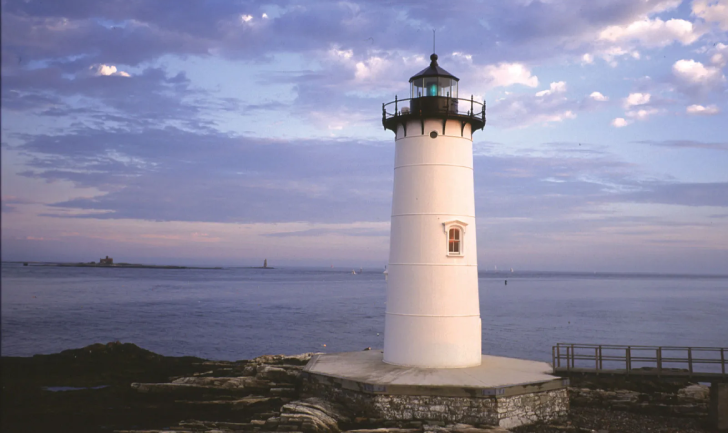Purple Heart Day
Purple Heart Day, observed annually on August 7th, honors the brave men and women of the U.S. military who have been wounded or killed in action. The Purple Heart is one of the oldest military decorations in the United States, originally established by General George Washington on August 7th, 1782, during the Revolutionary War. At that time, it was known as the “Badge of Military Merit” and was awarded to soldiers for their “unusual gallantry” in battle or “extraordinary fidelity and essential service.”

Lighthouse Day
National Lighthouse Day, celebrated annually on August 7th, honors the enduring legacy of lighthouses and the vital role they’ve played in maritime safety and history. The celebration marks the anniversary of the Lighthouse Act, passed by the U.S. Congress on August 7, 1789, which established federal responsibility for the maintenance and operation of lighthouses, beacons, buoys, and public piers. This act was one of the earliest public works initiatives of the new federal government, signed by President George Washington. In 1989, to commemorate the 200th anniversary of the act, Senator John H. Chafee and Representative William J. Hughes sponsored a resolution that designated August 7th as National Lighthouse Day—but only for that year. Although efforts to make it a permanent national observance have not succeeded, lighthouse organizations across the country continue to celebrate it annually.

August 7 is a date marked by significant historical events across various domains, including world history, science, and culture.
Historical Events
1782 – Establishment of the Purple Heart: On August 7, 1782, General George Washington created the Badge of Military Merit, which would later become known as the Purple Heart. This award was the first American military decoration and was intended to honor soldiers who displayed exceptional bravery. The Purple Heart is now awarded to U.S. military personnel who are wounded or killed in action.
1942 – The Battle of Guadalcanal Begins: During World War II, the U.S. Marines landed on the island of Guadalcanal in the Solomon Islands on August 7, 1942, marking the start of a critical campaign in the Pacific theater. The Battle of Guadalcanal was the first major offensive by Allied forces against the Empire of Japan and was a turning point in the war, leading to a series of Allied victories in the Pacific.
1960 – Ivory Coast Gains Independence: On August 7, 1960, the Ivory Coast (Côte d’Ivoire) declared its independence from France. This West African nation, led by President Félix Houphouët-Boigny, became one of the last countries in the region to gain independence from colonial rule. Ivory Coast’s independence is celebrated annually as a national holiday.
1998 – U.S. Embassy Bombings in East Africa: On August 7, 1998, al-Qaeda terrorists simultaneously bombed the U.S. embassies in Nairobi, Kenya, and Dar es Salaam, Tanzania. The attacks killed 224 people, including 12 Americans, and injured thousands more. These bombings brought global attention to the growing threat of international terrorism and were among the events leading up to the September 11 attacks in 2001.
1974 – Philippe Petit’s High-Wire Walk Between the Twin Towers: On August 7, 1974, French high-wire artist Philippe Petit performed an astonishing and illegal tightrope walk between the Twin Towers of the World Trade Center in New York City. Petit spent nearly 45 minutes walking, dancing, and performing stunts on the wire, 1,350 feet above the ground. This daring feat was later documented in the award-winning film Man on Wire.
1964 – Gulf of Tonkin Resolution Passed: On August 7, 1964, the U.S. Congress passed the Gulf of Tonkin Resolution, which authorized President Lyndon B. Johnson to use military force in Southeast Asia without a formal declaration of war. This resolution was in response to alleged attacks on U.S. naval vessels by North Vietnamese forces and led to the escalation of U.S. involvement in the Vietnam War.
2007 – Barry Bonds Breaks Home Run Record: On August 7, 2007, Barry Bonds of the San Francisco Giants hit his 756th career home run, surpassing Hank Aaron’s long-standing record of 755. Bonds’ achievement was celebrated but also marred by controversy due to allegations of performance-enhancing drug use, which has led to ongoing debates about his place in baseball history.
1944 – IBM Dedicates the Harvard Mark I: On August 7, 1944, IBM dedicated the Harvard Mark I, also known as the Automatic Sequence Controlled Calculator (ASCC), at Harvard University. The Mark I was one of the earliest electromechanical computers and played a key role in advancing computing technology, particularly during World War II.
1909 – Alice Huyler Ramsey Completes Cross-Country Drive: On August 7, 1909, Alice Huyler Ramsey, a 22-year-old woman, completed a historic cross-country drive from New York to San Francisco. She was the first woman to drive across the United States, covering 3,800 miles in 59 days, which was a remarkable achievement in the early days of automobiles.
Birthdays
1742 – Nathanael Greene: An American general during the Revolutionary War, Nathanael Greene was one of George Washington’s most trusted officers. He played a crucial role in the southern campaign, leading to the eventual defeat of British forces.
1876 – Mata Hari: Born Margaretha Geertruida Zelle, Mata Hari was a Dutch exotic dancer and courtesan who was convicted of being a spy for Germany during World War I. She was executed by firing squad in France in 1917, and her life has since become legendary.
1903 – Louis Leakey: A British paleoanthropologist and archaeologist, Louis Leakey made significant contributions to the understanding of human evolution. His discoveries in East Africa, alongside his wife Mary Leakey, provided key evidence of early human ancestors.
1927 – Carl Switzer: An American actor best known for his role as Alfalfa in the Our Gang (also known as The Little Rascals) series of short films. Switzer became an iconic figure in early American television and cinema.
1942 – Garrison Keillor: An American author, humorist, and radio personality, Garrison Keillor is best known as the creator and host of the popular radio show A Prairie Home Companion. His storytelling and wit have made him a beloved figure in American culture.
1955 – Wayne Knight: An American actor and comedian, Wayne Knight is widely recognized for his role as Newman on the television series Seinfeld and as Dennis Nedry in the film Jurassic Park. His roles in both comedy and drama have earned him a lasting place in popular culture.
1958 – Bruce Dickinson: An English singer and songwriter, Bruce Dickinson is the lead vocalist of the heavy metal band Iron Maiden. Known for his powerful voice and energetic stage presence, Dickinson is a key figure in the heavy metal music scene.
1960 – David Duchovny: An American actor, writer, and director, David Duchovny is best known for his roles as Fox Mulder in the television series The X-Files and as Hank Moody in Californication. His work in both television and film has earned him critical acclaim and a loyal fanbase.
1975 – Charlize Theron: A South African-American actress and producer, Charlize Theron is known for her roles in films such as Monster, Mad Max: Fury Road, and The Italian Job. She has received numerous awards, including an Academy Award for Best Actress.
1980 – Abby Cornish: An Australian actress and rapper, Abby Cornish is known for her performances in films such as Bright Star, Sucker Punch, and Three Billboards Outside Ebbing, Missouri. She has received critical praise for her versatile acting abilities.
1987 – Sidney Crosby: A Canadian professional ice hockey player, Sidney Crosby is considered one of the greatest hockey players of all time. He has played his entire NHL career with the Pittsburgh Penguins, leading them to multiple Stanley Cup victories and earning numerous individual accolades, including the Hart Trophy and the Conn Smythe Trophy.
Deaths
117 – Trajan: The Roman Emperor Trajan, who ruled from 98 AD until his death in 117 AD, is remembered as one of Rome’s greatest emperors. Under his rule, the Roman Empire reached its maximum territorial extent, and he is known for his public building projects and social welfare programs.
1420 – Thomas of Lancaster, 1st Duke of Clarence: The second son of King Henry IV of England, Thomas of Lancaster was a prominent military commander during the Hundred Years’ War. He played a significant role in the English campaigns in France but died at the Battle of Baugé in 1421.
1848 – Jöns Jacob Berzelius: A Swedish chemist, Berzelius is considered one of the founders of modern chemistry. He is credited with developing chemical notation and discovering several elements, including cerium and thorium. His work laid the foundation for much of modern chemical science.
1941 – Rabindranath Tagore: An Indian polymath, Tagore was a poet, musician, artist, and playwright who reshaped Bengali literature and music. He was the first non-European to win the Nobel Prize in Literature in 1913. Tagore’s contributions to literature, education, and social reform had a profound impact on India and the world.
1963 – Patrick Kennedy: The infant son of U.S. President John F. Kennedy and First Lady Jacqueline Kennedy, Patrick Bouvier Kennedy was born prematurely on August 7, 1963, and tragically died two days later due to complications. His death deeply affected the Kennedy family and the nation.
1978 – Jomo Kenyatta: The first President of Kenya, Jomo Kenyatta was a key figure in the country’s struggle for independence from British colonial rule. As President from 1964 until his death in 1978, he played a central role in shaping modern Kenya and is regarded as the “Father of the Nation.”
1987 – Takashi “Shigeo” Iwata: A Japanese poet and writer, Iwata was known for his works that explored the complexities of human emotion and the experience of the Japanese people in the post-war era. His poetry and prose are celebrated for their deep sensitivity and insight.
2001 – Larry Adler: An American harmonica player, Larry Adler was one of the most skilled and celebrated harmonica virtuosos of the 20th century. His career spanned decades, and he was known for his work in classical music as well as collaborations with popular musicians.
2011 – Harri Holkeri: A Finnish politician and diplomat, Holkeri served as Prime Minister of Finland from 1987 to 1991 and was a key figure in international diplomacy, particularly in Northern Ireland, where he played a role in the peace process that led to the Good Friday Agreement.
2022 – Roger E. Mosley: An American actor best known for his role as Theodore “T.C.” Calvin on the hit TV series Magnum, P.I., which ran from 1980 to 1988. Mosley was beloved for his portrayal of the helicopter pilot and friend to the main character, Thomas Magnum.


